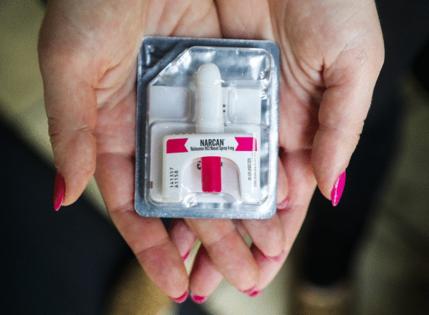Massachusetts Legislature considers plan to install Narcan at all MBTA stations
Published in News & Features
BOSTON — The Bay State is considering a proposal to make doses of the opioid overdose reversal drug Narcan available at all MBTA stations, with one state senator saying the life-saving drug should be “as common as fire extinguishers.”
The proposal offered by State Sen. John Keenan would expand on a pilot program that began in the summer of 2024 and saw the installation of naloxone — the generic name for Narcan — at five Red Line stations.
According to Keenan, who testified in favor of his bill at a Joint Committee on Transportation hearing on Tuesday, there can be no doubt that the drug’s availability leads to lives saved.
“This bill looks to expand on the Red Line law and make it apply to all four subway lines,” Keenan told his legislative colleagues. “You just don’t want to see anyone die in our transit system.”
The bill — known as An Act directing the Massachusetts Bay Transportation Authority to place naloxone in subway stations — would do precisely as it is named and require that all MBTA stations have at least two “freestanding unalarmed naloxone boxes” each containing two “units of 4 milligram intranasal naloxone spray.”
“Frankly, I believe every bus and commuter rail car should have naloxone. It should be available as much as possible. It should be as common as fire extinguishers and light bulbs,” Keenan said.
The proposal would also require the boxes to be checked and restocked daily, to have nearby flyers explaining how naloxone is administered, and for the MBTA to report back on the program no more than 18 months after its implementation.
A line in the state’s fiscal 2024 spending plan set aside $95,000 to establish the original Red Line program as a pilot, and Keenan said that a report was due to the Transportation Committee on the results of the program by Sept. 1. That report has not been filed with the committee yet.
The MBTA, he said, has also not fully complied with the 2024 law’s requirements to install Narcan at all its Red Line stations, instead limiting the drug’s availability to Quincy Center, Ashmont, Andrew, South Station, and Harvard stations.
Keenan encouraged his colleagues on the Transportation Committee to “exercise oversight authority” and demand the MBTA explain why they have not complied with the law.
A spokesperson for the MBTA did not return a request for comment regarding Keenan’s assertions.
When the program was launched in 2024, MBTA General Manager Phil Eng said that it was clear that Narcan “saves lives” and that the MBTA was joining several other national transit agencies in a White House sponsored initiative.
“We are proud to lead the way as one of the six transit entities that have joined the White House’s ‘The Challenge to Save Lives from Overdose’ initiative. Given the role our stations play in the communities with the thousands that traverse them, it makes them ideal pilot locations to include as part of this project,” Eng said in 2024.
According to Keenan, the Bay State saw nearly 3,400 overdose deaths in 2023.
The following year the number fell to 1,336, according to Department of Public Health data. Boston alone saw a decline in the number of deaths of 38% from 2023 to 2024, representing the lowest rate of overdose deaths seen since 2015.
According to the Centers for Disease Control, drug overdoses have become disturbingly more frequent in the past 20 years, “with the number of deaths increasing approximately 520% from 1999 to 2023,” but that the trend seems to be reversing.
“New preliminary data predicts 76,516 drug overdose deaths for the 12 months ending in April 2025. This is a 24.5% decline in U.S. overdose deaths compared to the previous year,” the CDC reports.
While those numbers represent a positive trend, Keenan said, they could be lowered further simply by expanding the availability of life saving naloxone.
________
©2025 MediaNews Group, Inc. Visit at bostonherald.com. Distributed by Tribune Content Agency, LLC.







Comments